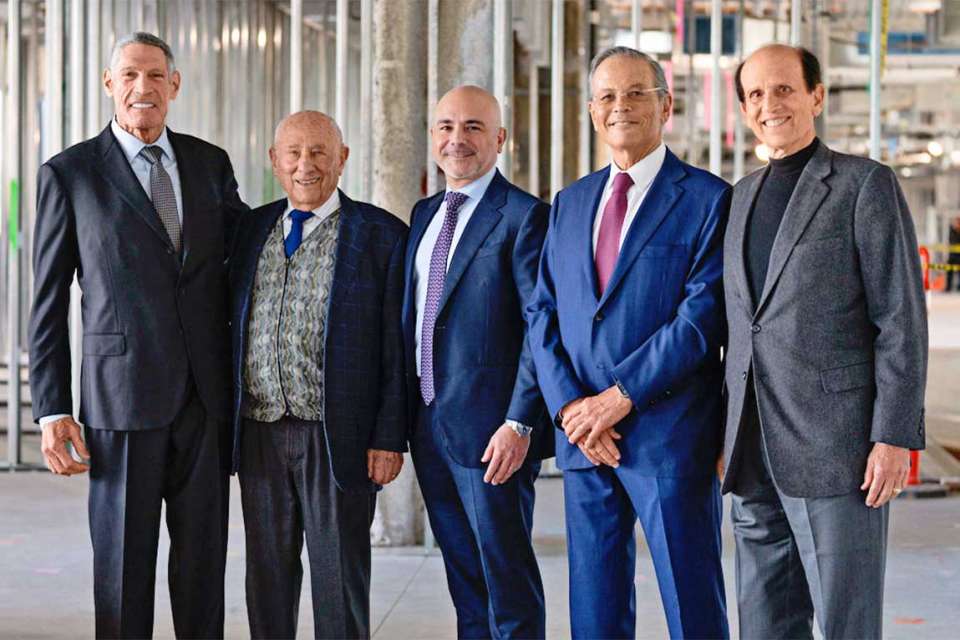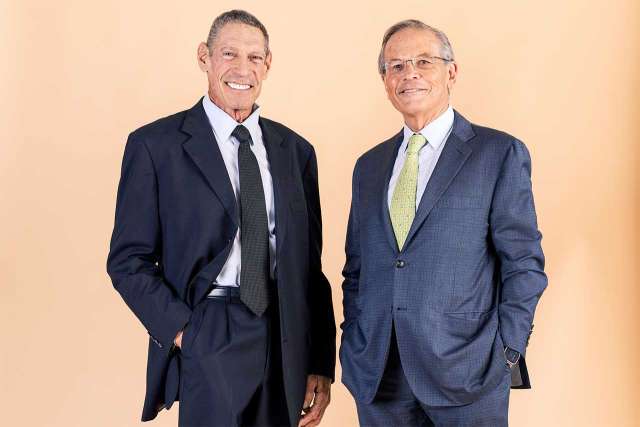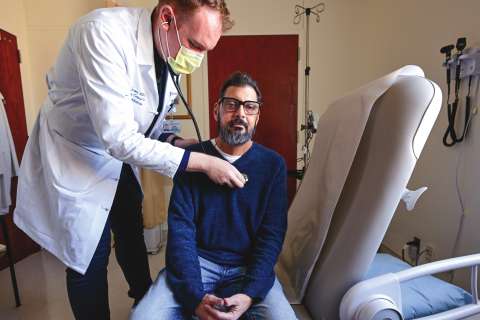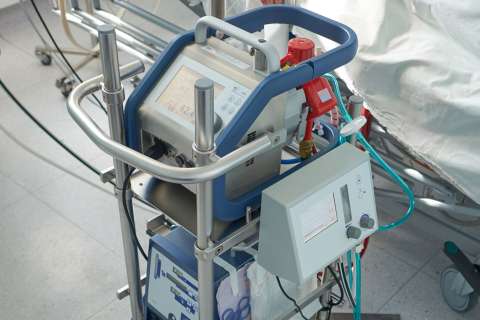The Research Engine that Can
The newly established California Institute for Immunology and Immunotherapy has the potential to reshape the future of science and medicine.
There was a time, Arie S. Belldegrun, MD, recalls, when immunotherapy was considered a backwater of cancer research. “People didn’t even know how to spell it,” he says. Not anymore. Today, immunotherapy — the prevention or treatment of disease by stimulating the body’s immune response — is at the forefront of modern biomedical research. Powered by advances in genetic engineering, gene editing and gene therapy, it touches on areas of medicine ranging from cancer to heart disease to Alzheimer’s.
Now, the push to further advance this leading-edge research is gaining momentum with the establishment of the California Institute for Immunology and Immunotherapy (CIII), a public-private partnership with the State of California to be operated as a non-profit medical research organization governed by an independent board that includes UCLA Health representatives. Its aim is multifold: to understand the human immune system and to deploy it to treat, cure and prevent disease, advancing human health, while also catalyzing economic growth and innovation in Southern California. “UCLA’s goal is to build the immunology equivalent of Silicon Valley in Los Angeles,” said John C. Mazziotta, MD (RES ’81, FEL ’83), PhD, vice chancellor of UCLA Health Sciences and CEO of UCLA Health, when announcing establishment of the institute, which will be housed in the newly acquired UCLA Research Park.
“Our vision for this institute is for it to be a ‘field of dreams,’” says Gary K. Michelson, MD, “and the world’s leading center for the study of the immune system to develop advanced immunotherapies to prevent, treat and cure all of the diseases that afflict people today and to end these diseases.”
Dr. Belldegrun, director of the UCLA Institute of Urologic Oncology and the founder of several successful biotechnology companies, and Dr. Michelson, an orthopaedic surgeon, prolific inventor and philanthropist, are among the six philanthropic co-founders of the CIII. (The others are Michael Milken, Meyer Luskin, Sean Parker and Eric Esrailian, MD [FEL ’06], chief of the Vatche and Tamar Manoukian Division of Digestive Diseases at UCLA.) Dr. Belldegrun and Dr. Michelson spoke about the institute and its mission with Dr. Esrailian. Their conversation has been edited for length and clarity.
Both of you trained and practiced as surgeons. How did you transition from practicing medicine to entrepreneurship?
Dr. Arie Belldegrun: I always wanted to be on the cutting edge of science and clinical medicine. I started pursuing a PhD in immunology, trained as a urological surgeon and pursued a post-doctorate fellowship in cancer immunotherapy at the National Institute of Health’s National Cancer Institute, under the leadership of Dr. Steven Rosenberg, considered to be the father of modern immunotherapy. I practiced as a cancer surgeon and an academic physician-scientist at UCLA, where I was involved in immunotherapy and gene-therapy translational research and conducted innovative clinical trials in cancer. That is how I was introduced to the pharmaceutical world of drug development. It was, therefore, a natural progression for my colleagues and me to try to create our own innovations and our own products, with the hope of helping thousands, or hundreds of thousands, of patients rather than treating or operating on one patient at a time. With the help of professors at UCLA’s Anderson School of Management, we were able to come up with our first business plan, and were ready to launch our first biotech company, UroGenesys, which we later renamed Agensys.
Gary, what was your path?
Dr. Gary K. Michelson: There is a story: A boy is walking along a beach after a storm, and there are thousands of starfish washed up on the sand. As he walks, the boy stops, picks one up and throws it back into the water. Then he walks a little more, picks up another and does the same thing, over and over. A man walks up to him and says, “There’s so many starfish, you can’t save them all. What you are doing isn’t going to make a difference.” With that, the boy bends over, picks up another starfish and throws it back into the ocean. “Well,” he says to the man, “it’s going to make a difference to that one.” As surgeons, we treat patients one at a time. We are that boy; we will make a difference to that one. Which is wonderful. But if I can invent a device that enables me to do this operation faster, safer and better, and that invention gets into the hands of 10,000 other surgeons, it can help so many more people. Through entrepreneurship, I realized that this was an opportunity to do what I was doing on a much grander scale.
Those are wonderful responses, thank you. Let’s segue to the California Institute for Immunology and Immunotherapy.
Why are immunology and immunotherapy two fields that are worth this massive investment of time and money?
Dr. Belldegrun: Immunology and immunotherapy are not two different areas: Immunology is the parent and immunotherapy is the child. Immunotherapy is the translation of immunology into an immune-based therapy and creating a product or a drug to treat a multitude of diseases. The CIII is not meant to be an institute that just studies immunology. And it is not about research per se. It is about translating the latest and best research into therapies to help patients. I strongly believe that immunology and immunotherapy is the most exciting and rewarding science today because it is rapidly transforming all areas of medicine and how we can treat almost all diseases. It has already become a multibillion-dollar industry, and it’s still in its infancy. It is bringing together researchers, genetic scientists, cell-therapy manufacturing experts, clinicians, translational scientists, AI and quantum engineers to solve a single problem. Nothing is more exciting than that.
Dr. Michelson: I believe in basic research, but I do not believe in science for science’s sake alone. I believe in science for our sake, for people’s sake. In my view, the purpose of science and research is to have discoveries manifest in the world, to change the world, to help people and to make the world a better place. When you look at human suffering and all the chronic diseases that afflict and kill people, the one thing they have in common is that it is our own immune system that is the mediator of every one of those diseases. Rather than what I call “reductive research,” which drills way down to get to the bottom of a specific problem but really has no application beyond that, we need science that looks for big answers to solve a lot of problems. That is what the CIII will do.
Something like the CIII has not existed for Los Angeles before.
We are not like Boston, the Bay Area or San Diego. What will this mean for the city?
Dr. Michelson: The County of Los Angeles has a population that is greater than the combined populations of the seven smallest U.S. states, so it is remarkable that we have not had the gravitational mass to hold on to all of the brilliant graduate students who go off to other places to pursue their careers. It’s not as if L.A. doesn’t have its share of billionaires who can invest in biotech; the problem is that there’s been no biotech to invest in here. Until now. We need an iron core at the center of our city to provide the gravitational mass to bring everything together and provide an attractive environment for these brilliant scientists.
Dr. Belldegrun: As a UCLA professor involved with the pharmaceutical industry, I often found myself traveling to San Diego, to Irvine, to San Francisco, to Seattle, and then to Boston and New York. It became clear to me that, other than Amgen, which was in Thousand Oaks, Los Angeles was like a “fly-over city” for biotech and pharma. I believe we have been able to change that image somewhat in the past decade with companies like Astellas, Gilead and AstraZeneca establishing a presence here. We are making progress, but it’s just the beginning and not good enough. We have all the right components here in Los Angeles to create a world-class powerhouse: outstanding academic research institutions — UCLA, Caltech, USC, Cedars, City of Hope — with brilliant scientist, clinicians, graduate students and plenty of access to venture capital money. The missing link has been the right location for a biotech campus and an entrepreneurial ecosystem that will breed more biotech companies. Pharma, as always, will then follow. Establishing the CIII on the Westside of Los Angeles, close to the freeway and the airport and adjacent to, but not on, the UCLA campus is a dream come true and will provide a highly desirable location for biotech entrepreneurs. Our aim is to establish a world-class California translational institute, not limited to UCLA — hence the California name. We have, therefore, reserved a seat on our board of directors for a member from one of our neighboring institutions.
Dr. Michelson: Another thing that makes this institute radically different is that we’re going to invest in young researchers. The CIII will have its own embedded, self-funded incubator/accelerator. A graduate student can come in saying, “I’ve got this great idea,” and we can hear it — kind of like Shark Tank — and determine if it is valuable and worth funding. Who better to judge an idea about immunology than the world’s leading immunologists?
We’ve touched on the fact that this is the California Institute for Immunology and Immunotherapy, but as founders, we chose UCLA as the strategic partner.
Why is UCLA the ideal partner?
Dr. Michelson: UCLA is an incredible university with great scientists. Most importantly, it has a fabulous network of doctors and hospital beds. One of the big problems that universities have had is the so-called Valley of Death. They come up with a discovery, and unless they can get pharma to do something with it, it dies. So, they’re at the mercy of the pharmas, and often they don’t get great value for what they’ve discovered. One of the things that makes UCLA really unique is that it has access to GMP (good manufacturing practice, to ensure that products are consistently produced and controlled according to quality standards) to create our own experimental drugs and run our own trials, without being at the mercy of pharma. That makes UCLA a wonderful partner.
Dr. Belldegrun: UCLA has been a recognized powerhouse of immunology and immunotherapy for decades, making it an ideal partner for the CIII. Generations of students have been trained in the field here, and many of them are now UCLA professors. Multiple faculty members have assumed leadership roles in the academic immunotherapy societies, were active participants in the development of the most successful immunotherapy drugs and were founders and partners in transformative immunotherapy biotech companies. I have travelled the world and can assert with confidence that the culture of immunology and gene therapy ingrained at UCLA is unique and well-recognized globally. That unique culture provides an excellent draw to attract the best and brightest to join us.

We’ve covered a lot of ground. What is your long-term vision and hope for the legacy of this institute?
Dr. Michelson: When the State of California agreed to give us several hundred million dollars for the CIII, Gov. Gavin Newsom asked me a question: “Why do I need you when I’ve got 10 other universities?” And the best response was to ask, “So how come they haven’t done it?” Because they can’t. It’s not in their DNA. And I think now people are starting to get it. We need to be product oriented. We need to be building a complete ecosystem of biotech startups. One of them will be the next Amgen or Genentech. It’s going to take a while, but we’ll get there.
Dr. Belldegrun: For me, the CIII legacy should be a world-class entrepreneurial and well-funded institute that combines top immunology science and the brightest scientists dedicated to rapid translation to immunotherapy drugs, products and companies. It needs to function as a profitable business operation, governed by an independent and experienced board of directors, with a single goal of taking advantage of its own intellectual property to create the most successful biotech companies. Academia is important, research is important, and the institute will have all of that, but it needs to be differentiated as a well-oiled business machine. The board’s mission should be to create a vision for the CIII of how to secure the future of the institute as a financially successful enterprise, independent of outside pressures, an evergreen operation that continues to attract the most entrepreneurial brains in the industry. It will take some time, but once we have proven our success and the technology developed enters the market, this unique approach will start returning capital to the institute, its scientists and to the university, as well. Success will breed success.
For more information see California Institute for Immunology and Immunotherapy.





